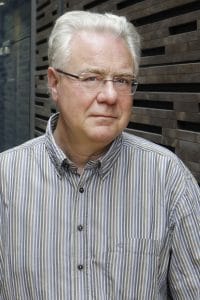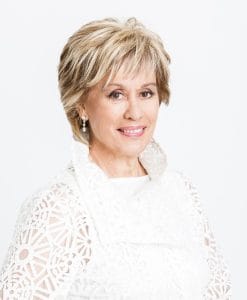Olaf Bär and Kiri Te Kanawa in interview
27 May 2019
Olaf Bär was the men’s second prize laureate at the first Mirjam Helin Competition in 1984. Here, the German baritone tells about his impressions of Helsinki back then and now, and talks about the importance of competitions. Dame Kiri Te Kanawa, for her part, says she is looking for the interests of the audience in a competition, too. She also wants to advocate for music education.

In the past week, Olaf Bär has been thinking back to 35 years ago. “The atmosphere here is still fantastically friendly”, he says. “Competing felt like just having a concert back then, too. And I love that the audience have been so interested. Many of them are making notes, and you can hear from the reactions that they are judging in a very proper way – of course, I do not always agree.”
Like other Jury members, Bär says he finds himself in great company. “It is not that they have made huge careers, it is that they are great human beings.”
Bär stresses the duty a singer has to the audience. “The listeners give us the most important thing they have: their time. In a competition, I am looking for a voice with life and with a feeling for the composer.” The baritone also thinks that the singing world has become more competitive, internationally. “That is why these kind of competitions are very important – for the singers to see where they stand.”
Back in the day, it was special for a young East-German singer to visit Helsinki. “It was very strange to meet singers like Birgit Nilsson. But it was even more special to visit the West”, Bär tells. “I got to know Helsinki, because I did a lot of trips. The Finnish design was famous, as it is now, and I do not know how many glasses I brought home with me. I still have some of them.”
Bär also remembers Mirjam Helin very well. “I will never forget her elegance, which was not of the showy kind. I was glad to meet her again much later, unexpectedly”, Bär tells. Namely, Helin was in the audience of a concert in Bär’s hometown Dresden, in the rebuilt Frauenkirche. “She said she wanted to see it before her death.”
Finding your own path – sustaining the community

As the competition progresses, Dame Kiri Te Kanawa says she is looking more and more for competitors who could have something special to give to the audience. “I try to interpret, what pleases me and what I think would also please the audience,” Te Kanawa says. Understanding a style is important, but it is the whole which matters. “In the end, you can hopefully say: overall, they knew what they were doing.”
A young singer should decide what to focus on. “If you are constantly changing teachers, repertoire and so on, it will never settle. You have to ask yourself, where you want to go and where your voice fits.” One can fixate on wrong things, too. “You have to drive yourself to stay firm on the path you believe in. If you hold on to the center of your expression, it should be enough to push you through a career.”
The foundation Te Kanawa has established grants scholarships and mentoring to New Zealand singers aiming for an international career. To one singer, agonizing over his career choices, Te Kanawa had to give the advice of tossing a coin. “If you make a mistake, it is important that it is your mistake.”
The singer is worried about the cuts to music education in England, her country of residence. “We are trying to make sure that the music continues in schools. People do have an interest in music, and it is not elitist to take care of continuity.” She compares the musical world to the one of Formula One or tennis. “There, some people can not even get a look in, but ours is a community thing. So many people can enjoy it, and not only on a very high level.”
Te Kanawa glances smilingly at a table where her fellow Jury members are sitting. “They are charming, are they not?”
Text: Justus Pitkänen
